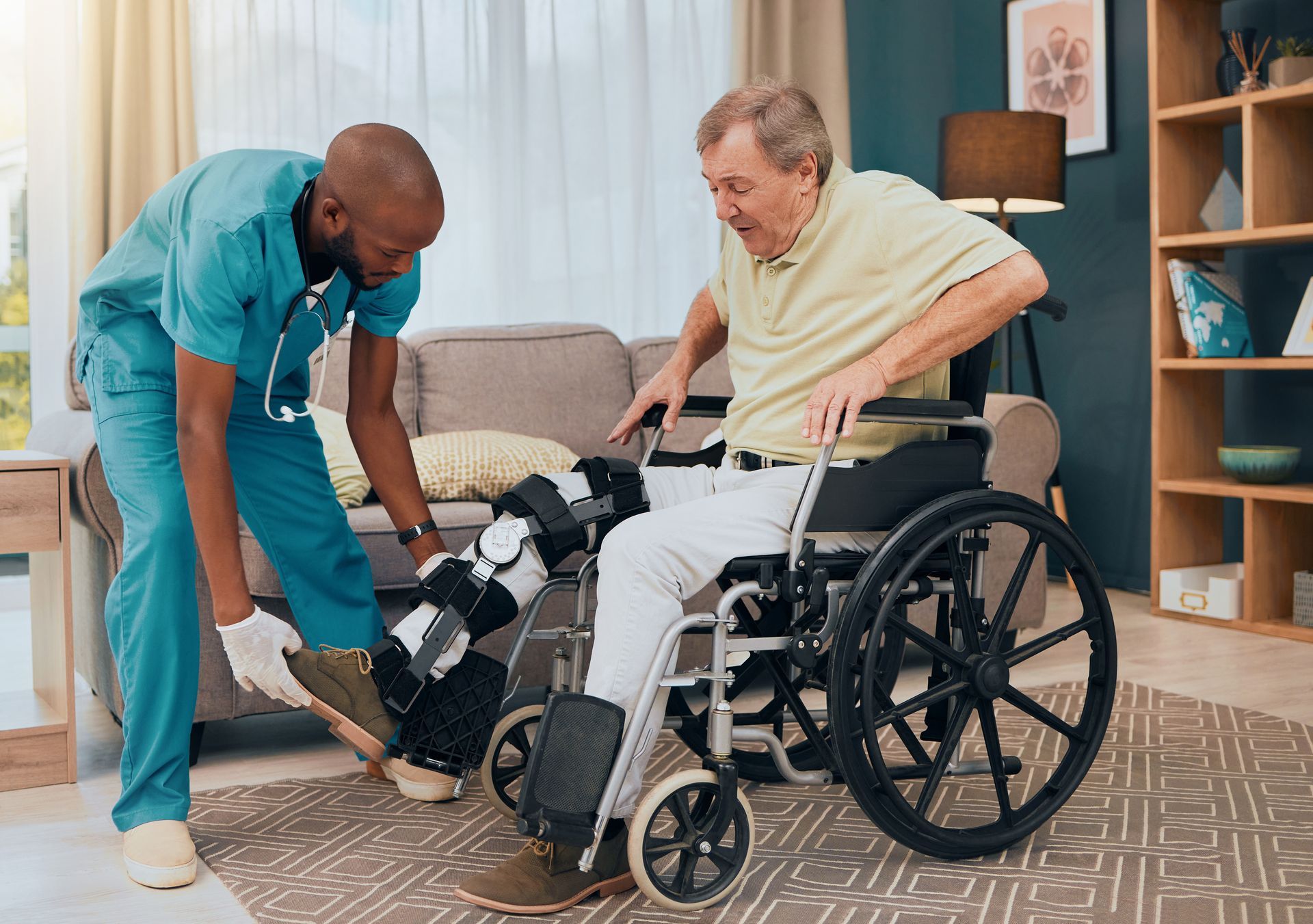6 Advantages of Home-Based Post-Surgery Care for Seniors
Undergoing surgery can be a difficult experience for anyone, particularly for seniors who might face longer recovery periods and additional health complexities. The challenges of surgery and the subsequent recovery process can be significantly stressful, not only physically but also emotionally and financially. According to a study by ALES, 40% of senior patients can develop postoperative complications, and 45% of these will be major complications. Due to these challenges, many seniors are opting for home-based post-surgery care as a more comfortable and practical alternative.
Home-based post-surgery care offers a unique advantage by providing a familiar and comforting environment, which is crucial for the emotional well-being of seniors during their recovery. Unlike hospital settings, where patients are often surrounded by unfamiliar sights and sounds, home-based care allows seniors to recover in the comfort of their own homes, surrounded by loved ones and familiar routines. This can greatly reduce stress and anxiety levels, leading to a faster recovery process.
Lets explore more about post surgical care, the main benefits it offers and how it can positively impact the lives of seniors.

What post surgical care?
Postoperative or post-surgical care refers to the management and care strategies implemented after a patient undergoes surgery. This care aims to ensure a smooth and complication-free recovery by monitoring the patient’s health, managing pain, preventing infection, and facilitating physical healing. For seniors, post-surgical care often extends beyond these basic needs, encompassing emotional and psychological support as they adjust back to their daily routines. Home-based post-surgical care, in particular, integrates these services within the comforting confines of the patient's residence, offering a more personalized and compassionate approach to recovery. It is tailored to meet the individual’s specific health conditions, preferences, and lifestyle, thereby promoting a more effective and faster recuperation process.
Key Components of Post-Surgical Care
The key components of post-surgical care, particularly for seniors at home, include:
- Pain Management: Effective pain control using medication, therapy, and alternative pain-relief methods to ensure the patient's comfort and promote healing.
- Wound Care: Regular cleaning and dressing of surgical sites to prevent infection and monitor the healing process.
- Mobility Assistance: Help with movement and gentle exercise to maintain muscle strength and prevent stiffness, improving overall recovery speed.
- Medication Management: Ensuring the senior takes the correct dosage of prescribed medications at the right times to manage pain and prevent complications.
- Nutritional Support: Providing a balanced diet rich in vitamins and minerals to support healing and restore strength.
- Personal Care: Assistance with daily activities such as bathing, dressing, and toileting to maintain personal hygiene and comfort during recovery.
- Health Monitoring: Regular checks on vital signs, surgical sites, and overall well-being to detect and address any complications early.
- Emotional and Psychological Support: Offering companionship and emotional support to help cope with the stress and isolation often experienced during recovery.
What are the Benefits of In-Home Post-Surgery Care for Seniors?
Understanding the importance for senior care at home after surgery, here are six advantages of opting for home-based post-surgical care:

1. Tailored and Personalized Care
One of the most significant advantages of home-based post-surgery care for seniors is the opportunity for tailored and personalized care that is often unattainable in a traditional hospital setting. In hospitals, the focus is generally on managing a large number of patients, which can lead to a one-size-fits-all approach to care. This can be particularly challenging for seniors who may have unique recovery needs or multiple health conditions that require special attention. Home-based care, on the other hand, allows for a care plan that is specifically designed around the individual's health requirements, preferences, daily routines, and even their living environment.
Having this kind of personalized approach not only ensures that the care provided is more effective but also significantly improves the comfort and satisfaction of the senior during their recovery period. It enables caregivers to adjust treatment and support services as the patient's needs change, facilitating a more dynamic and responsive care process.
2. Recovering in a Comfortable and Familiar Environment
Another profound advantage of opting for home-based post-surgery care is the ability for seniors to recover in an environment that is both comfortable and familiar to them. The familiarity of one's own home provides a sense of security and comfort that cannot be replicated in a hospital setting. This familiar environment can significantly ease stress and anxiety, which are known factors that can impede recovery. Being surrounded by personal belongings, sleeping in one's own bed, and the presence of family and pets can all contribute to a more positive and conducive recovery atmosphere. Having a familiar setting not only fosters emotional well-being but also promotes stronger and quicker physical recovery by minimizing the risks associated with hospital-acquired infections and providing a serene environment free from the frequent disruptions found in clinical settings.
3. Enhanced Safety and Reduced Risk of Infections
One of the pivotal benefits of in-home post-surgery care for seniors is the significant reduction in the risk of infections and complications. Healthcare facilities, despite their strict protocols, can be hotbeds for various pathogens due to the high volume of patients. In contrast, the home environment inherently carries a lower risk of exposure to these infectious agents, thereby safeguarding seniors during a vulnerable phase of their recovery.
Furthermore, caregivers play a crucial role in enhancing home safety through meticulous assessments and modifications. They evaluate the living space to identify potential hazards that might lead to falls or accidents — common concerns for seniors post-surgery. Following this assessment, caregivers implement necessary changes, such as securing rugs, adjusting furniture arrangements, and installing grab bars in strategic locations. These adjustments not only minimize the risk of falls but also contribute to creating a secure and conducive recovery environment, tailored to the senior's mobility and health status.
4. Support with Daily Living Activities and Home Care
An integral aspect of in-home post-surgery care for seniors is the support provided in daily living activities and caring for the home environment. This comprehensive approach ensures that seniors not only receive medical and emotional support but also assistance with routine tasks that may become challenging during the recovery period.
- Assistance with Daily Living Activities: Daily living activities, including bathing, dressing, cooking, and eating, are essential for the senior’s dignity and quality of life. Caregivers offer the necessary support to ensure these activities can be performed safely and comfortably, adapting their level of assistance as the senior’s ability to perform these tasks independently improves over time.
- Home Care and Maintenance: Keeping the living environment clean and organized is vital for both the physical health and the mental well-being of recovering seniors. Caregivers assist with household chores such as laundry, dishwashing, and dusting, along with more demanding tasks like grocery shopping and errand running. This not only helps to maintain a healthy living environment but also alleviates the stress and physical strain that these activities could impose on seniors during their recovery.
Providing support in these areas is crucial for the senior’s overall health and recovery, enabling them to focus on their rehabilitation without the added burden of daily chores and activities.
5. Enhanced Family Involvement and Support
Family involvement is a critical component of in-home post-surgery care for seniors, offering emotional, practical, and logistical support that significantly enriches the recovery experience. Unlike institutional settings, where family interaction may be limited to specific visiting hours, home care encourages active participation from family members throughout the recovery process. This closer involvement not only strengthens familial bonds but also provides the senior with a comforting sense of belonging and love, crucial for mental and emotional well-being.
Family members can collaborate closely with caregivers to understand the senior's needs better, receive education on how to support their loved one effectively, and make informed decisions regarding their care together. This collaborative approach ensures that the care plan is consistently aligned with the senior's changing needs and preferences, contributing to a more comprehensive and cohesive care strategy.
6. Personalized and Flexible Care Scheduling
The adaptability of in-home post-surgery care schedules presents a major advantage for seniors and their families. Unlike hospital or residential care facilities that operate on fixed schedules, in-home care allows for personalized care plans tailored to the individual's specific needs and preferences. This flexibility ensures that appointments, medication management, physical therapy sessions, and other essential healthcare activities can be arranged at times that are most convenient and beneficial for the senior's recovery process. It also permits the inclusion of rest periods and recreational activities into the daily schedule, contributing to a more balanced and enjoyable recovery experience. This level of personalization and scheduling flexibility significantly enhances the effectiveness of the recovery process, further promoting the senior’s well-being and quality of life during their post-surgery period.
The At Home Advantage
The benefits of in-home post-surgery care for seniors cannot be overstated. It symbolizes a blend of comfortable recovery in a loving, familiar environment, significantly reducing the risks of infections, enhancing safety through personalized space modifications, supporting daily living activities, intensifying family involvement, and offering highly personalized and flexible care schedules. These advantages collectively contribute to a more effective and enjoyable recovery process, underlining the importance of choosing the right care provider.
It's crucial for families to select a care provider that understands the unique needs of seniors and offers comprehensive services that cater to all aspects of recovery and daily living. The right provider will not only ensure the physical well-being of the senior but will also pay close attention to their emotional and mental health, which is paramount during the recovery phase.
Choose Chanda Care for Your Loved One's In-Home Post-Surgery Care Needs
At Chanda Care, we are committed to providing exceptional in-home post-surgery care for seniors across Western MA, from Agawam, MA, to Longmeadow, and beyond. Our dedicated team of in-home caregivers understand the nuances of post-surgery recovery and works tirelessly to ensure that every senior under our care receives the personalized and respectful treatment they deserve. With Chanda Care, you can rest assured that your loved one will receive the highest quality care, tailor-made to fit their recovery needs, right in the comfort of their own home. Contact us today to learn more about how we can support your family through the recovery process and beyond.
Services

